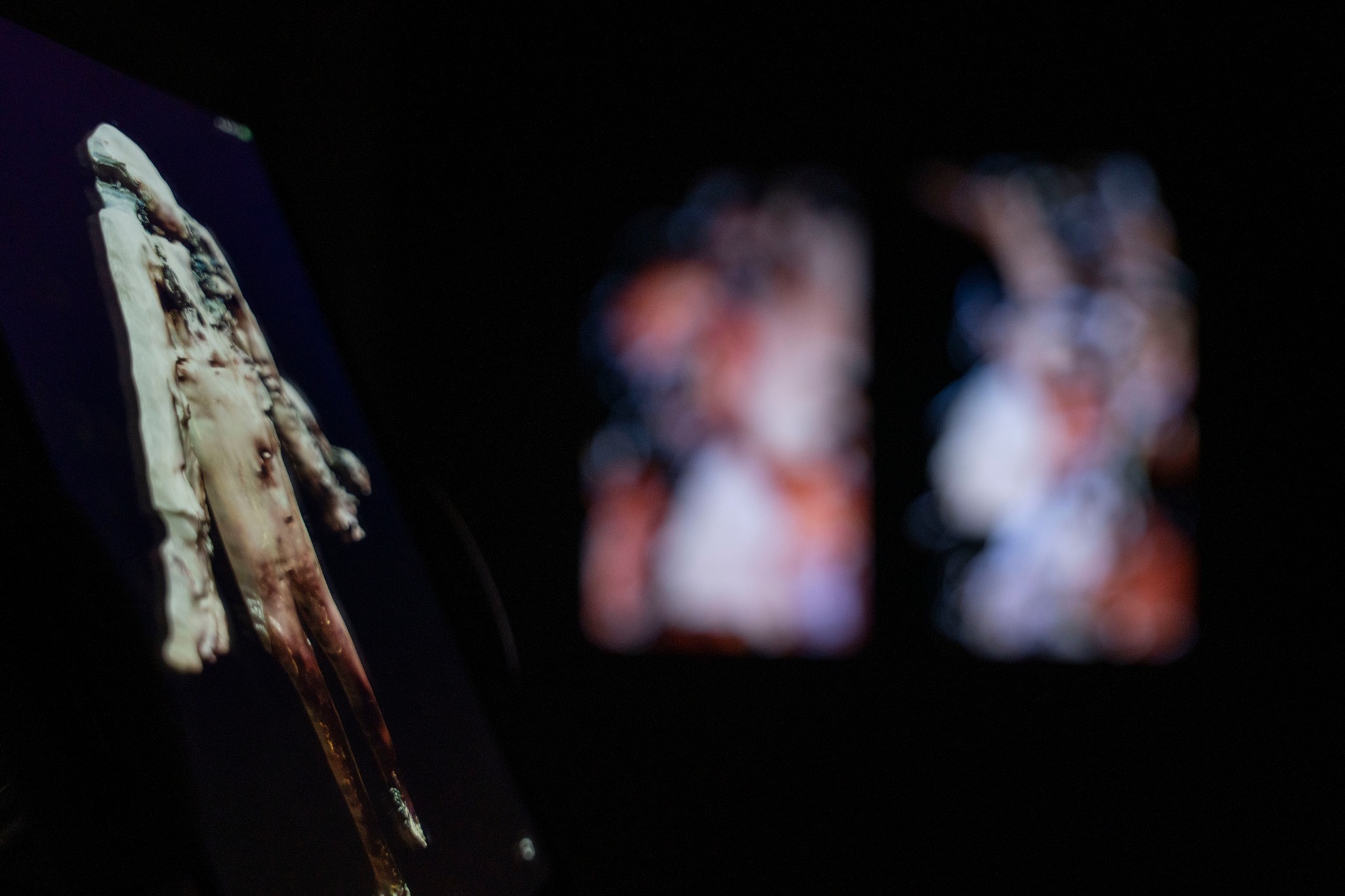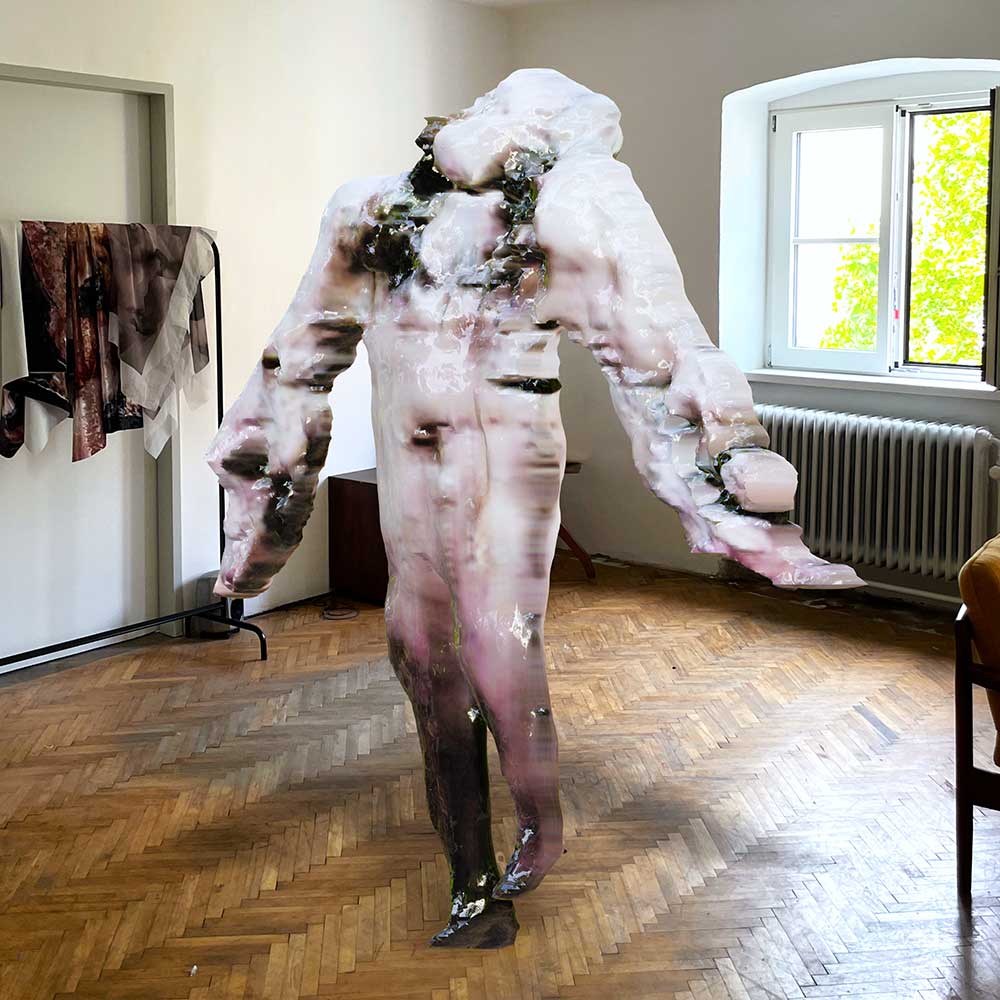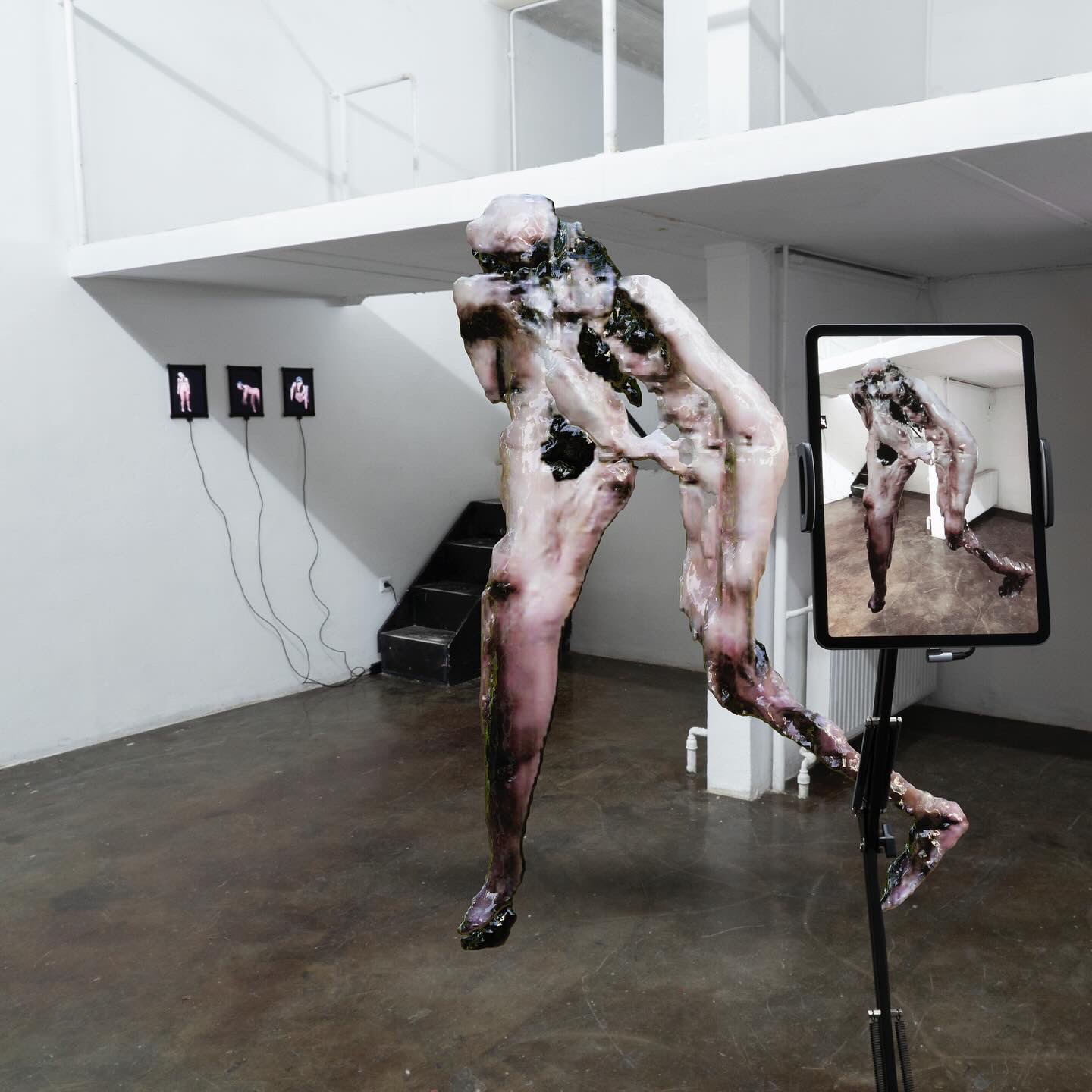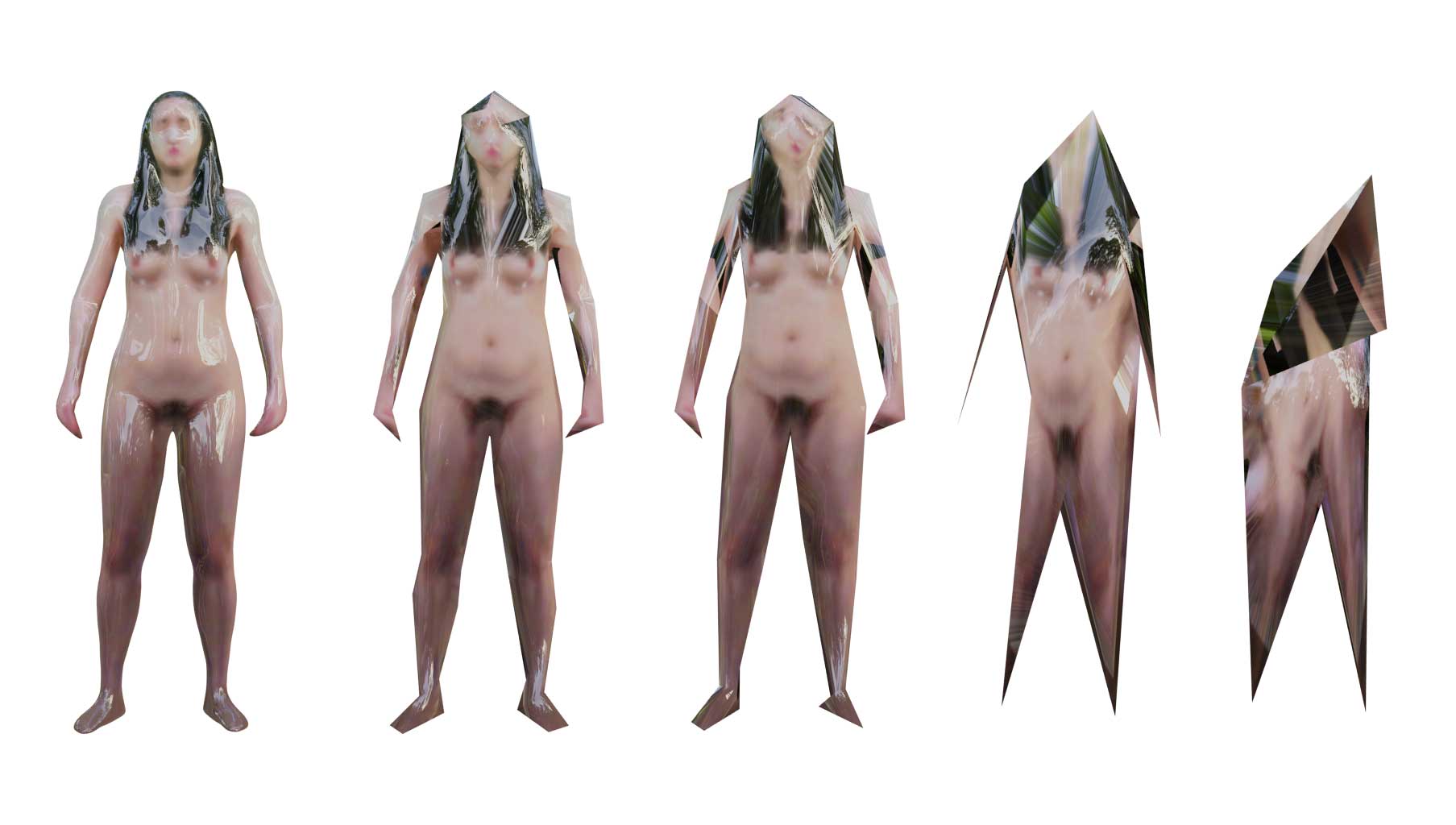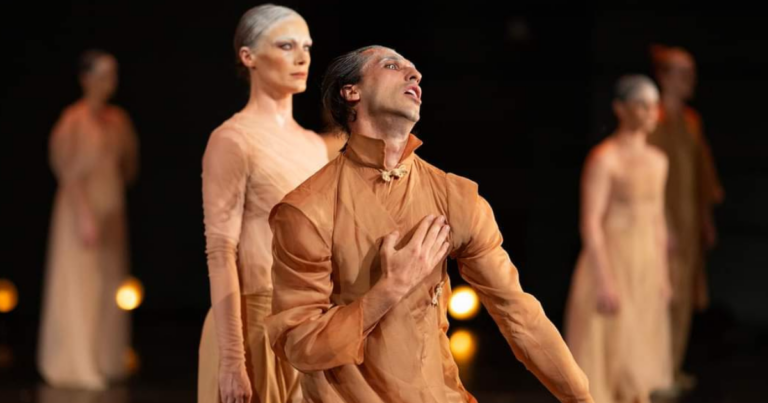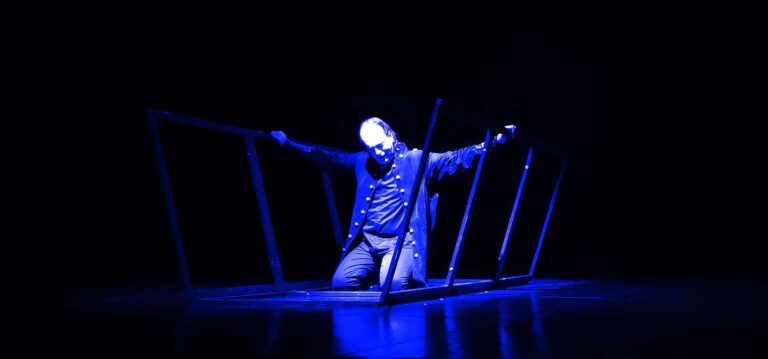"You know me so well"
Milot Gusia
Exploring the contemporary human in Martina Menegon`s performances
Martina Menegon (born 1988) is a digital artist who creates intimate assemblages by interweaving elements of physical and virtual worlds. These assemblages explore the contemporary self and the hybrid body. Experimenting with new forms of performance art, Menegon creates hybrid self-portraits through the art of interactive reality and extended reality. These self-portraits are realized in the form of Glitches, or intentional analog and digital errors, which artist creates by corrupting information or physically manipulating electronic devices.
Menegon uses these new forms of expression to explore new fluid simulated identities and to create disorienting experiences which despite their virtual nature become physically visible or materialized.
In the exhibition entitled "you know me so well", the artist continues to explore the complicated relationship between tangible and digital bodies through a series of screens spread throughout the space of gallery 17.
In the center of the gallery, visitor is faced with the work entitled "I'm sorry I made you feel that way". This interactive and performative self-portrait explores new possibilities for empathy and brings to the fore the care of our hybrid being by offering us a truly unique experience.
In this complex work, the artist's biometric data, collected on a daily basis through a smart ring worn by the artist, is connected to an artificial avatar generated through Artificial Intelligence technology developed with Machine Learning (or Machine Learning AI).
All this complex technology enables the artist to express the physical state of her body - especially stress and fatigue - in her virtual image. When the needs of the physical body are neglected and fatigue and stress levels are heightened, the AI body visually deteriorates, expressing fragmented and abstract behaviors that make interacting with it increasingly difficult and challenging.
Although, the work emphasizes the care of our hybrid being, it also as well highlights the importance of caring for our physical being.
By combining very intimate and personal biometric information with an avatar generated through artificial intelligence, the work "I'm sorry I made you feel that way" enables us to visualize the artist's physical condition online, simultaneously drawing our attention to our self and our hybrid bodies.
This intimate and delicate connection creates a new sense of responsibility for our virtual extensions but also emphasizes the importance of our self-care.
This Artificial Avatar generated through Machine Learning technology creates a new reality of digital existence, where the lines between truth and imagination dissolve. This virtual being, born from the union of Machine Learning and artistic creation, redefines how we interact, express and even perceive ourselves.
What is a Digital Avatar? An artificial avatar is a digital representation of the user in a virtual environment. Unlike traditional avatars, which relied on manual adjustment, the AI-led avatar evolves autonomously. It learns from data, adapts to different contexts, expressing the full human complexity.
This creature possesses personality, can converse, express emotions and even learn from interaction with others.
Will these creatures in the future be a virtual reflection of our being, but independent, to become our virtual mirrored friends?
All the magic of these generative models is based on the GAN system, or Generative Adversarial Networks that lead to the birth of these avatars. They consist of the generator and the discriminator, interconnected in a creative duel. The generator creates avatars, while the discriminator critiques their authenticity.
StyleGAN is a variant of GAN that sculpts hyperrealistic faces. It learns from databases, capturing physiological nuances such as wrinkles, details and smiles, thereby synthesizing complex virtual figures.
This performative self-portrait, more than giving us an esthetic presentation, raises questions and dilemmas about the future of technology.
Where will the implications of this technology lead? Today, we are faced daily with virtual influencers, or AI avatars, who are infiltrating social media like Instagram models with billions of followers (as the case of Lil Miquela). Currently, large companies regularly collaborate with these virtual models for various marketing campaigns.
Among other things, the work also raises questions about the ownership of these avatars. Who will own our avatars? Us or their creators? As avatars gain more and more autonomy, many ethical and legal questions will arise in the virtual future of the Internet.
Can our AI avatar inherit our digital assets? These avatars will not remain confined to screens. As technology evolves, they will be distributed through AR glasses, holograms, and virtual worlds.
Will this bring human immortality in digital form? An immortal digital presence, or an AI echo of our physical presence.
While we are sculpting our AI avatars, we are shaping a digital legacy.
Will these virtual creatures, born of code and imagination, be our heirs who will carry our essence into the abyss of the virtual cosmos?
The work also touches on the topic of the future of biometric data.
What is biometric data in the first place and why this data is so important?
Biometric data is what captures our individual essence, or the biological material that makes us unique. Our fingerprints; Our DNA or the genetic code that sets us apart; retinal patterns, or the unique pathways of blood vessels in our eyes; Iris patterns, or the unique rings of color in our eyeballs; our appearance; our unique voice and physical features. Biometric data even includes the way we walk, or the way we sign. All these patterns are unique to every individual in the world.
Who owns biometric data? The individual or the collector? How will our biometric data affect our digital heirs?
The work also raises questions about the hybrid body, and the multiplicity of human death. What will happen when these hybrid forms meet mortality? Will we overcome the Cartesian approach through technology?
Descartes with his philosophy separated the mind from the body – the thinking self from the physical vessel that embodies it. But breakthroughs in cognitive neuroscience challenge this view. Our bodies are no longer isolated entities, but they now inhabit both the tangible world and the ever-expanding virtual world.
Is man turning into a cyboorganic assemblage? We are no longer just flesh and blood, we are becoming cyboorganic hybrids. Our minds are expanding into external devices, smartphones, wearables and AI systems. We are increasingly interpreting the world through these prosthetic extensions.
Let's imagine AI avatars that will inherit the physical human. How will they be remembered, and what stories will they create in the future? Our hybrid body will transcend the limitations of space and time. We are becoming more than biological beings, we are turning into cyboorganic narratives.
Our lives are no longer limited to the physical world. We are increasingly inhabiting virtual spaces, connected through screens, leaving a digital footprint of our existence in pixels. Therefore, our digital being – social network profiles, avatars, online interactions – are increasingly important.
Our digital lives are affecting our emotions. Social networks are evoking pleasure, greed and fear. Virtual interactions are increasingly affecting our mental well-being.
Does the work "I'm sorry I made you feel that way" visually express the real human condition, which is increasingly grotesque? The physical self is being compromised by the ever greater care towards our virtual being and the best possible online presence.
This virtual image generated through artificial intelligence is nothing like the beautiful images of virtual portraits on social networks and those generated through artificial intelligence applications.
This is an image that really manages to visualize today's contemporary human overwhelmed by stress and psychological fatigue caused by the ever-increasing pursuit of technology.
The work "I'm sorry I made you feel that way" reveals the spiritual nature of the man marginalized by technology, which in turn is taking more and more space of his physical life.
In Gallery 17, the artist Martina Menegon revealed her creativity through selected works in the exhibition entitled: "you know me so well". This project came to life through the collaboration between Seventeen and the Ars Electronica festival within a Techne theme.
External Links:
- Artist Talk & Guided Tour – Martina Menegon. Linku: https://galeria17.org/artist-talk-guided-tour-martina-menegon/
- Martina Menegon ne Galeria 17. https://galeria17.org/martina-menegon/
- Martina Menegon faqja zyrtare. Linku: https://martinamenegon.xyz/

About the author
Milot Gusia works as a professor and editor, as well as a critic in the local and international art scene. He has worked on a number of programs in the field of art and culture.
He completed his master's studies in Graphic Design at the University of Pristina, as well as his MBA studies at Staffordshire University, Great Britain.

